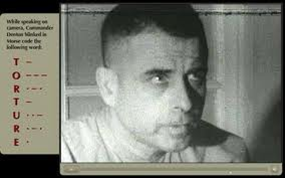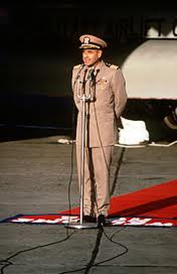Lee Ellis's Blog, page 336
April 18, 2014
The Basics of Defining a Healthy Culture – See This Simple Presentation
What is the definition of building a healthy culture? This simple, quick presentation from Icalia Labs outlines the basics for creating a culture in your work, and we wanted to share it with you.
Do you agree with the presentation? Anything to add?
Culture in a team from Icalia Labs


April 17, 2014
New Article: Developing Next Generation Leaders is a Critical Step to Future Success
Next Generation Leaders –
(1) How do you find the best ones? and
(2) How do you develop them?
So many organizations don’t have a system in place for developing and evaluating young leaders. Leadership consultant and author, Lee Ellis, offers some practical advice in his latest article in Smart Business Magazine.
Click Here to access the article on Smart Business Magazine, and please share your thoughts and comments.


April 16, 2014
Video Interview Clip from Lee Ellis – “Describe An Important Leadership Lesson that You Still Use Today”
In this 90-second clip, leadership consultant and author, Lee Ellis, gives an example of an important leadership lesson that he learned from his life-changing experience in the Vietnam POW camps that he still uses today.
Watch his comments, and then share your thoughts –


April 10, 2014
Voting Primaries Are Coming Up – What’s a Leader to Do?
Some state voting primaries are coming up very soon. Who can you trust to represent you? Which one has the courage to focus on the right things and the courage to act on them?
Use the FREE Leading with Honor Voter Evaluation Guide to choose your best public servant. Click to download.

This free, 4-page guide helps evaluate political candidates beyond their position on the issues.


April 9, 2014
Video Clip – “29 Ways to Stay Creative” – Check it Out
Honorable leaders always push to be creative and innovative, and they create an environment for their team to be creative, too.
Take 3 minutes and scan the video clip “29 Ways to Stay Creative” in your work. Which one will you try?


Have you Struggled Recently with Being a Courageous Leader?
Are you struggling with being courageous today—that is “doing what’s right even when it doesn’t feel natural or safe”? Being a courageous leader is the best path to long-term success.
We want to help—join the ‘Leading with Honor’ Courage Challenge at the link below. And, feel free to share your courageous leadership stories, too!
Join the Courage Challenge – Click Here


April 3, 2014
Want the best advice on becoming a great leader? Here’s Step One.
 Want the best advice on becoming a great leader? Lee’s first leadership lesson in Leading with Honor is knowing yourself—your authentic strengths and struggles that everyone else has already noticed.
Want the best advice on becoming a great leader? Lee’s first leadership lesson in Leading with Honor is knowing yourself—your authentic strengths and struggles that everyone else has already noticed.
This article in Business News Daily offers 7 Tips for Improving Self-Awareness. Click Here to read this article on their website and share your comments. What are some ways that you stay connected as authentic and self-aware?


April 2, 2014
The Last of the Big Three: Fellow POW and Rear Admiral, Jeremiah Denton, Passes Away, Remembered
Another brave and courageous man, Rear Admiral Jeremiah Denton USN (Ret), passed away on March 28, 2014. He was 89 years old.
To his fellow POWs, he was the last of the “Big Three” to pass away (the other senior leaders being Vice Admiral, James Stockdale USN (Ret) and Brig. Gen. Robbie Risner USAF (Ret)). Including another noted senior leader in the camp, Col. Bud Day USAF (Ret), three of them died in the last 12 months at either 88 or 89 years old.
In addition to his military accomplishments, he also served as a U.S. Senator from the state of Alabama.
In this tribute to Admiral Denton’s memory, we’ll share his heroic acts from Lee Ellis’ perspective as a fellow POW. Admiral Denton plays a major leadership role in Lee’s personal POW experience as told in his latest book, Leading with Honor: Leadership Lessons from the Hanoi Hilton; and Denton is a critical figure in Lee’s speeches and writing on the topic of leadership and honor.
Here’s an excerpt from Lee’s book on one of the most courageous acts during the Vietnam War –
“Facing similar propaganda exploitation, CDR Jeremiah Denton endured excruciating torture before finally agreeing to go before the propaganda cameras. Prior to filming, his captors prepped him for several days on what he was supposed to say about America’s ‘cruel and oppressive war.’
Here is his surprising response after their prep work:
At risk of his life, Denton departed from the party-line script and said, ‘… whatever my government is doing, I agree with it, and I will support it as long as I live.’ The V were stunned. Not wanting to lose face with the reporters, however, they allowed Denton to continue answering questions about the daily camp routine. They were unaware that as the cameras rolled, he was blinking his eyes in Morse code: T – O – R – T – U – R – E. The payoff was huge. When the video of the interview went public, it was the first time the U.S. government had accurate information about the treatment of POWs.
Angered by Denton’s departure from the script, but still unaware of his encoded communication, the V displayed their trophy at another staged press conference two weeks later. This time Denton stood up while on camera and walked out. The consequences were severe. The V put Denton in the rope torture and then beat him until he was unconscious.
Denton’s courage is all the more exemplary when one considers that he knew that this type of torture awaited him if he defied his captors. During his seven and a half years in captivity, he never hesitated to provide leadership when he was the SRO of a cellblock or camp. Although that made him a prime target for abuse and exploitation by the enemy, he steadfastly pushed himself and the enemy to the limit. He deliberately kept the torture team occupied, so they would have less time to harass his fellow POWs. Denton’s will to win was motivated by his strong sense of personal and professional commitment, undergirded by his deep faith in God.
On February 12, 1973, Denton was the senior ranking officer (SRO) on the first aircraft to land at Clark Air Base in the Philippines, and he spoke the first public words of the North Vietnam POWs. He stepped to the tarmac and said ‘We are honored to have had the opportunity to serve our country under difficult circumstances. We are profoundly grateful to our Commander-in-Chief and to our nation for this day. God bless America.’“
He represented Lee and the other POWs well in freedom just as he had done so courageously in captivity. We formally salute Admiral Denton and will never forget his commitment to truth, freedom, and authentic leadership to his nation, family, and friends.
Below are a few key articles from other news outlets sharing the life and accomplishments on this great man. Please share his life and courage with others.
Article Links:
C-Span Interview from the G. Gordon Liddy Show
C-Span Interview from the Washington Journal. This includes Denton’s take on “terrorism” in 1985 and was decades ahead of others


April 1, 2014
Four Superhero Ways to Show Courage in Leadership
By Lee Ellis
What is your greatest fear in your work? What is the one thing that you don’t want others to know about you? Perhaps it’s burying past mistakes or poor decisions, or maybe you’re in a new leadership role where you feel ashamed or ill-equipped about your lack of formal education or work experience. If you don’t handle these nagging, fearful thoughts and feelings, then they will manifest unhealthy leadership attitudes like control and manipulation.
Unfortunately for many people, the term courage has been limited to the examples that we see in action films or books—the superhero leaping from building to building, jumping out of an airplane to land on a moving train to get the bad guy, or simply using sheer power and strength to overcome obstacles. In reality though, most courageous acts happen in everyday life, but they may never get as much recognition on the movie screen.
Here are some powerful ways to show courage every day in your work –
1. Be open, honest, and transparent
From my experience as a junior ranking prisoner in the Vietnam POW camp*, I was able to observe the leadership of our highest and best officers and occasionally some of the worst. The most consistent theme was courageous transparency. In the POW camps, all the niceties of leadership were immediately stripped away along with the former advantages of power and authority. Higher ranking officers were naturally the ones that the enemy focused on first and the most often. They were subject to torture more often, more isolated, were beaten more often and yet they still had to lead, make policy and then live by the policies they made. They could not hide their interactions with the enemy because it was obvious to everyone; however, they were transparent about it.
When they were beaten into submission, they would admit what they had done. The environment was amazingly transparent. There was no pretending, which quickly revealed true character.
There was always temptation to take a shortcut or say something to get the enemy off your back. In that process, I saw that courage was the key to leading with honor.
2. Learn to trust and be trusted
Leaders need to take the time to build trust. It’s so important for success in work, and I don’t believe that much emphasis is given on this important principle during formal training and leadership development.
Most leaders know that they need to do some teambuilding, but they automatically think that’s singing Kumbaya and hugs; but to create an authentic level of trust, you must get to know each other.
One of the best ways to be open and gain trust is taking a personality assessment and sharing the results. A personality assessment** is the common denominator to understanding somebody’s leadership style, his or her strengths, struggles and fears. Knowing that about each other helps to build trust among team members.
3. Apply accountability through a core set of values and ground rules
The issue of accountability is huge and doesn’t get enough attention; it’s often absent when clarity is also lacking. Accountability and clarity go hand in hand, and those two important concepts require leaders to define a core set of values. Organizational or team values have to be operative and not aspirational. You can have aspirational values, but you need to be clear that that is what they are. For instance, if the value is against gossiping but we still gossip, then it’s not a value; it’s an aspirational value.
Having those few core values, then preaching them from the highest to lowest levels so they are inculcated into daily work life, builds a work culture.Values will hold you together and give you the freedom to empower people in ways nothing else will.
Teams that build ground rules or rules of engagement for how they will work together can hold each other accountable in positive ways.
4. Make steady, daily progress developing your team or staff
Professional development of others may not seem like a courageous act, but to do it on a consistent basis is a hallmark of great leadership.
Leaders have to be developing their people all along the way, all the time, and they need to go first by setting an example of personal growth. This allows the leader to have the credibility to mentor, coach, and make expectations known, all the while clarifying why you do things a certain way and telling stories about how you learned about this value or that leadership principle.
Making the Shift
There are many ways to be a courageous leader, and these are just a few practical ways. But you may notice that the common thread in these examples is shifting your inward focus on fears and inadequacies to an outward focus on doing the right thing to be an example and help others. If you’re focused on building and equipping others to succeed, then courage will eclipse your own personal fears. Choose at least one of these courageous acts of leadership, and commit to applying it in your daily work. What other powerful ways do you show courage every day? Please share your comments –
Watch this clip on my definition of courage and leading with honor:
Related Links:
*You can read stories about these courageous leaders in my latest book, Leading with Honor: Leadership Lessons from the Hanoi Hilton. Click here for details.
**Get an introductory snapshot of your leadership strengths and struggles with a FREE Leading with Honor Assessment. Click here to register.
~~~~~~
As president of Leadership Freedom® LLC, a leadership and team development consulting and coaching company, Lee Ellis consults with Fortune 500 senior executives in the areas of hiring, teambuilding, human performance, and succession planning. His media appearances include interviews on networks such as CNN, C-Span, ABC World News, and Fox News Channel. His latest award-winning book about his Vietnam POW experience is entitled Leading with Honor: Leadership Lessons from the Hanoi Hilton. Learn more at www.LeadingWithHonor.com.


March 26, 2014
A Must-Read Article for All Leaders – “Miserable & Magical: Disconnected in a Hyper-Connected World”
 If you’re not one of the thousands of leaders that have read this article and graduation address entitled “Miserable & Magical: A Graduation Speech for Paradoxical Times”, here’s your invitation to consider the thoughts and perspective from author and speaker, Nipun Mehta.
If you’re not one of the thousands of leaders that have read this article and graduation address entitled “Miserable & Magical: A Graduation Speech for Paradoxical Times”, here’s your invitation to consider the thoughts and perspective from author and speaker, Nipun Mehta.
More than a decade ago, he walked away from a lucrative career in high-tech to explore the connection between inner change and external impact.
In this celebrated article, he calls out the paradoxical crisis of disconnection in our hyper-connected world. Please click here to read from the Daily Good Website.
Would you agree that many people and leaders have become profoundly disconnected? Read his solutions, and then share your thoughts –









